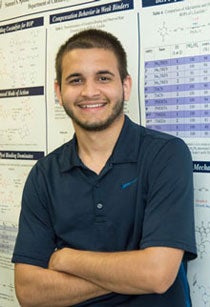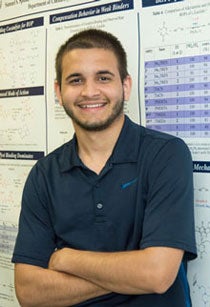 KINGSTON, R.I., April 25, 2016—For years, Sam Spink has spent long hours in a chemistry lab at the University of Rhode Island studying chemical compounds called polymers.
KINGSTON, R.I., April 25, 2016—For years, Sam Spink has spent long hours in a chemistry lab at the University of Rhode Island studying chemical compounds called polymers.
That hard work has paid off.
Spink has won a $7,500 Barry M. Goldwater Scholarship, the most prestigious undergraduate national scholarship for students in the fields of mathematics, the natural sciences and engineering.
What’s more, Spink is the only Rhode Islander, and the only student from a Rhode Island college or university, to be selected for the award this year.
“I’m thrilled,” says Spink, 21, of South Kingstown, who is majoring in biomedical engineering. “I’m also grateful to all the people at URI who helped with the application. In terms of future opportunity, the scholarship should open a lot of doors.”
Growing up in South Kingstown, Spink cultivated an interest in science as a toddler, hanging posters of astronauts in his room and playing with interactive books about the solar system. His favorite was Saturn: “The rings looked kind of cool.” His parents, David and Bernadette Spink, were encouraging, but not overbearing.
“They were very supportive of anything I was interested in,” he says. That included a hike in the woods, sports, board games or piano classes. He spent his summers at a cabin his father built in Nova Scotia.
At South Kingstown High School, his interest in science soared. He took as many science courses as he could, from physics to biotechnology. “I developed a curiosity beyond the classroom,” he says. “I’d search Google for anything I wanted to learn more about, especially in science.”
After graduating as class valedictorian, Spink headed to URI, only 5 minutes away from his house. He had spent his high school days hanging out on the Kingston campus playing pickup football on the Quad and basketball in President David M. Dooley’s driveway. Many of his high school friends enrolled at URI too.
He focused on biomedical engineering and Spanish, which later turned into a minor. And he excelled academically, making the Dean’s list all three years and receiving the Walter E. Schmid Engineering Scholarship.
Spink has worked in the lab of Matthew Kiesewetter, an assistant professor in the URI chemistry department, since the summer following his freshman year, thanks, in part, to a fellowship from the National Institutes of Health.
“I feel fortunate to learn from this great professor and his graduate students who have put a lot of their time into helping my evolution in the lab,” Spink says. “It’s great to get this experience at such an early stage in my studies.”
He investigates ring-opening polymerization, a technique that makes polymers—chemical compounds made up of strings of bonded molecules—using organic catalysts to speed up the process.
One type of polymer is polyester, which is the material used to make water bottles, containers and clothing. But few people know that polymers are also used in biomedical research, including drug delivery and tissue regeneration and repair, as well as other kinds of treatment and therapy.
“In our lab we try to speed up the production of polymer materials without losing quality,” says Spink. “That’s important because you don’t want to lose precision when you accelerate reactions.”
His Goldwater essay, “Organocatalytic ring-opening polymerization and its impact on biomedical studies,” examines the uses of polymers and explores his development of a catalyst that enhances polymer production speed, in some cases 100 times faster than with other catalysts.
He also has an academic paper to his credit. He is the first-author in a paper published last August in the highly regarded chemistry journal, “Macromolecules.”
After graduating next spring, Spink expects to pursue a doctorate in biomedical engineering and conduct research involving polymer chemistry and biomedical engineering to tackle medical challenges, such as the use of polymer-based gels in tissue repair.
His future looks bright as a researcher.
“I love trying to understand concepts that don’t necessarily make sense right away,” he says. “It’s satisfying when you finally grasp something. It’s exciting to understand how the world works around you. It’s not a jump up shouting kind of exciting. It’s, like, ‘Wow, I get that.’ ”
The Goldwater Scholarship is so prestigious students can apply only if they’re nominated by their institution. At URI, the application process is conducted through the Office of National Fellowships within the Honors Program.
For the 2016-17 academic year, 252 Goldwater scholarships, including Spink’s, were awarded to undergraduate sophomores and juniors nationwide. They were selected on the basis of academic merit from a field of 1,150 mathematics, science and engineering students who were nominated by 415 colleges and universities. Spink is the 21st URI student to be honored with this distinction since the program started in 1987.
Besides Kiesewetter, Spink credits two other professors for guiding him through his studies and providing strong letters of recommendation for his application: Leonard Kahn, a physics professor; and Frederick Vetter, an associate professor in electrical, computer and biomedical engineering.
“Sam is such an unassuming character that when he joined our lab I had no idea—just like the people sitting in class with him every day—that I was talking to the proverbial ‘smartest person in the room,’ ” says Kiesewetter. “The whole lab is bursting with pride at Sam’s accomplishments and our strong belief that this kid is going places.”
Pictured above: Samuel Spink, 21, of South Kingstown, a junior at the University of Rhode Island who received a Barry M. Goldwater Scholarship for his science research. Photo by Nora Lewis.

